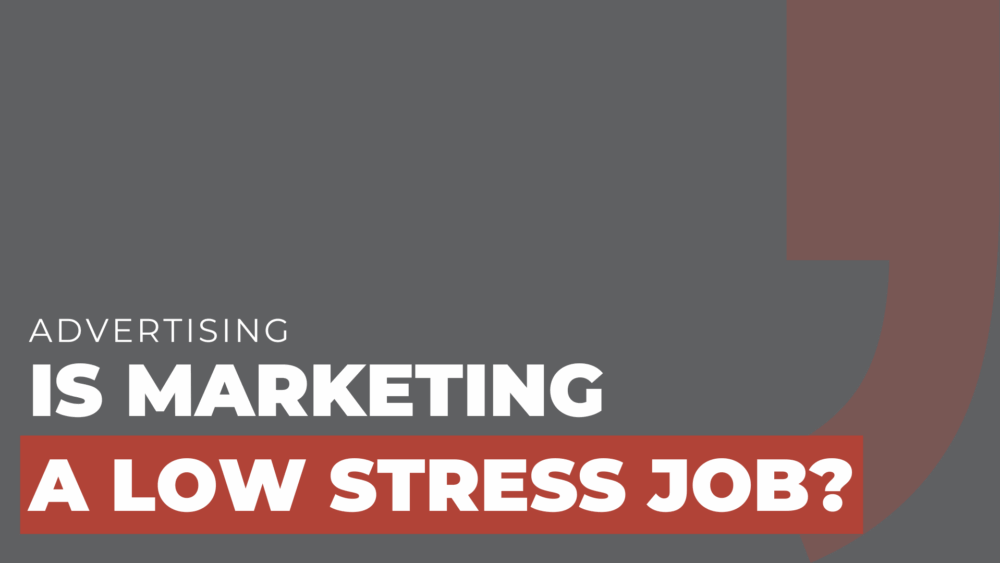What do you think of when you think of marketing?
Chances are, you think of fast-paced environments, long hours and high levels of stress.
But is marketing a low stress? Or high stress?
We’ll call it pretty high stress, based on statistics, which show that as many as 80% of marketers feel that they have too much word and not enough time.
And it’s no wonder why – marketing and advertising are constantly changing, with new technologies, strategies and trends emerging all the time.
Marketers are under constant pressure to stay ahead of the curve and deliver results for their clients or companies.
BUT let’s explore whether marketing really has to be that stressful.
The Misconception about Marketing Stress
One of the main reasons for the misconception that marketing is a high-stress job is due to its portrayal in media and popular culture.
TV shows and movies often depict marketing as a cut-throat industry, where employees are constantly competing against each other and working long hours to meet tight deadlines.
Do you believe that stress is an inevitable part of certain professions, including marketing?
This belief is often reinforced by societal norms and expectations that equate career success with constant busyness and stress.
However, a significant portion of workplace stress, including those experienced in marketing roles, is actually self-induced.
The Truth about Marketing Stress
While we do live in a world that can be stressful, most of our stressors actually come from our own personal struggles.
Many marketers hold the belief that we must constantly keep up with the fast-paced nature of the industry, leading to a fear of being left behind.
This fear can trigger stress, as we feel they must continually learn, adapt, and innovate to maintain relevance.
Additionally, marketers often grapple with imposter syndrome, doubting our abilities and fearing judgment or failure.
This belief can lead to overworking and stress as they strive to prove our worth.
Furthermore, a desire for perfection can cause marketers to obsess over every detail, leading to unnecessary worry and prolonged working hours.
Over time, these self-imposed beliefs and expectations can create a high-stress environment, impacting both our professional and personal lives.
It’s essential for us as marketers to challenge our own beliefs, set realistic expectations, and prioritize self-care to manage stress effectively.
Additional sources of stress can also be areas we are weak in.
For example, if we struggle with time management and don’t work on it, we’ll be in a constant state of stress that we could avoid by improving our skills.
Ultimately, the narrative that stress is an unavoidable part of marketing, or any profession, needs to be challenged and redefined.
Tips for Managing Stress in Marketing
While marketing can be a stressful career path, it’s important to remember that managing stress is a personal responsibility.
How you deal with stress and the boundaries you set for yourself play a significant role in maintaining your mental health.
Here are some tips and tools to help keep your stress levels in check, no matter what kind of job you have:
1. Prioritize Self-Care
Taking care of yourself should always be a priority.
Regular exercise, sufficient sleep, and a balanced diet can improve your overall well-being and resilience to stress.
Make time for activities you enjoy outside of work, such as hobbies or spending time with loved ones.
Self care also means addressing those negative self-perceptions that can contribute to stress.
Practice self-compassion and remind yourself that everyone makes mistakes and has areas for improvement.
And keep working to improve.
2. Set Realistic Expectations
Learning to manage expectations, both from yourself and others, really helps to reduce stress.
Understand your limitations and communicate effectively with your team and stakeholders.
Setting realistic goals and timelines can prevent burnout and help you stay focused on what truly matters.
3. Practice Time Management
Effective time management is essential in a fast-paced marketing environment.
Prioritize tasks, break them down into manageable chunks, and create a schedule that allows for focused work as well as breaks.
Utilize productivity tools and techniques like the Pomodoro Technique to enhance your efficiency.
4. Seek Support and Collaboration
Don’t hesitate to reach out for support or collaborate with your teammates.
Building strong relationships with colleagues can provide a sense of camaraderie and support during challenging times.
Sharing ideas, brainstorming together, and dividing tasks can alleviate some of the stress associated with overwhelming workloads.
5. Embrace Stress-Relief Techniques
Explore various stress-relief techniques that work for you.
This might include deep breathing exercises, meditation, mindfulness, or engaging in hobbies that help you relax and unwind.
Experiment with different methods to find what brings you calmness and peace of mind.
Is Marketing Worth It?
Despite the potential stress, marketing can be an incredibly rewarding career choice.
The opportunity to make a real impact on a brand’s success, the chance to unleash your creativity, and the constant learning and growth possibilities are some of the reasons why people are drawn to this profession.
Remember, stress exists in almost every job, but it’s how you manage it that makes a difference.
By implementing self-care practices, setting realistic expectations, managing your time effectively, seeking support, and adopting stress-relief techniques, you can navigate the high-stress world of marketing while maintaining your mental well-being.
At the End of the Day
Marketing may not be a low-stress job by default, but with the right mindset, strategies, and self-care practices, you can thrive in this dynamic industry.
Take control of your stress levels, set boundaries, and remember to prioritize your own well-being.


Comments are closed.